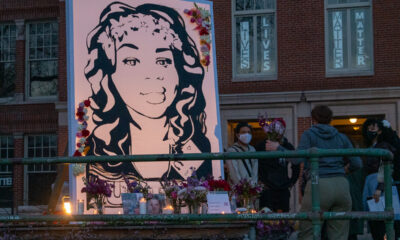BIPOC
Eviction moratorium allowed to end putting 8-million households at risk
A wealth transfer of $600 billion to $1 trillion begins in the United States, intensifying the housing crisis.

[KIRKLAND, Wash] – (MTN) Congress had no appetite to extended the eviction moratorium as the August recess began, allowing it to end at 12:01 AM on August 1. Now, up to 8-million households behind on rent or mortgages are facing an uncertain future.
When COVID-related shutdowns swept the country in March of 2020, U6 unemployment skyrocketed to 18.1%. Even before the public health and financial disaster, 40% of American families didn’t have $2,000 in emergency savings, let alone the 60 to 90 days of living expenses financial planners recommend. COVID wiped out entire industries such as hospitality, travel, and theater, and entertainment. For those in the service industry and gig economy, the slowdown has hit the hardest.
In response to the looming economic collapse, Congress passed the CARES Act, which included a one-time stimulus check of $1200 for some Americans, the Payroll Protection Program (PPP), and a moratorium on evictions and foreclosures. Despite trillions in aid, gaping holes remained that Main Street and American families have fallen through. Banks did not get guardrails on how to manage forbearances. Congress didn’t waive rent, only deferred it, and didn’t provide any financial support for small landlords. At one point, 12 million American households were $5000 or more behind on rent and 6 million households were facing foreclosure. The numbers have improved dramatically, dropping 50% for renters behind and 67% for mortgage holders.
Congressional leaders and the White House agreed on a second stimulus package in December 2020. President Trump initially did not sign the package, waiting until some benefits expired on December 26, before signing it the next day. The delay in signature created chaos for state unemployment systems. In March 2021, President Biden signed a third and almost certainly a final stimulus package, that extended the eviction moratorium another 30 days.
Up to $4 trillion in cash awaits for the foreclosures and evictions to begin
At the start of 2020, private equity firms were sitting on $2.5 trillion in cash. They call it dry powder, money ready for investment where the quants feel the best ROI awaits. By some estimates, there is now as much as $4 trillion on the sidelines.
The United States needs at least 7 million more affordable housing units than what is available today. Although rents in cities like Seattle have declined by 20% in 2020, property values have skyrocketed. Additionally, just as the moratoriums are ending, rents are increasing across the United States, sometimes dramatically.
Private Equity, institutional investors, and banks are already moving in. In 2019, 6% of single-family homes sold went into the rental market. Today it is 20%, and 25% in cities such as Houston. Blackrock and JP Morgan have been buying up entire neighborhoods, up to 140 homes at a time. Large investors are extending all-cash offers 20% to 50% over the asking price in some areas. The plan is to convert these into rentals.
The ripple effect impacts first-time buyers as it constrains an already tight market that can’t compete with the offers. The price raises existing prices for sale, driving up property taxes, gentrifying neighborhoods. For some, living “van life,” in trailers in special communities, or couch surfing has become the fallback plan.
For millions of Americans who are still paying rent, there is a hidden crisis in 2021. As small landlords lose their properties, these renters will get eviction notices from hedge funds and banks, with no interest in working with them to make sure they don’t end up homeless.
According to the Aspen Institute, 80% of those facing foreclosure and eviction are Black, Indigenous, or Persons of Color (BIPOC). For white households in America, the average net worth is $170,000, while for Black families, it is $17,000. This inequity can’t be explained away by education, income, or indebtedness. For white Americans, once they become homeowners, five percent will fall back into renting. For Black Americans, the rate is double, at 10%. Black-owned small businesses had limited access to government aid programs, and by August, 40% of all Black-owned small companies had failed.
BIPOC communities are more likely to be “needless delinquent.” Analysts estimate 400,000 American homeowners are eligible for forbearances on their mortgage but are not aware or have been given misinformation from their lender. For some of these struggling homeowners, the damage isn’t foreclosure but the destruction of their credit score. A lower credit score impacts interest rates, insurance premiums and can even be a barrier to getting a job.
What a $600 billion transfer in wealth looks like
Court systems from Boston to Seattle are bracing for a flood of forclosure and eviction filings. Here too, banks and large corporate property holders will benefit. With more legal resources and free cash to act, their cases will move to the front of the line. Mom and pop landlords will have to track their court cases independently, without a management company to oversee activity. Already facing a cash crunch, they’ll still have to pay court costs and lawyers’ fees, but that will only be the start of their problems.
The average American house has a value of $296,000. If 2 million households get foreclosed in 2021, that represents $600 billion in property dumped into the market. For the 4 million households facing eviction, the looming crisis is even worse. An eviction on a credit report is a barrier to permanent housing, requiring large deposits. They’re facing thousands in debt and potential judgments with interest they can’t pay. An eviction can be a scarlet letter for years, becoming a barrier to buying a car, getting a job, or buying a home.
Although it may appear to be a boom for landlords with 4 million families hitting a rental reset button, this isn’t the case. For many, the door to another rental will be closed. Landlords may evict a family who can’t pay the rent, only to find applications from families who were just evicted.
Millennials in high-paying office jobs fled the rental market in 2020 for the suburbs to escape COVID restrictions and get more space for a home office. Large investors can amortize their investment and use tax vehicles to lower their expenses. Mom and pop landlords will face a further reduction in their passive income, driving even more homes into sale and foreclosure.
Congress has no financial incentive to stop this nightmare. For both parties, lobbies, PACs, and dark money keep congresspersons and senators in their positions of power. For the 40% of Americans who live paycheck to paycheck, there is no lobby to bend representative ears and grease the palms.
The reality is if this financial disaster is not averted, the 6 million households on the brink could be the tip of the iceberg.










